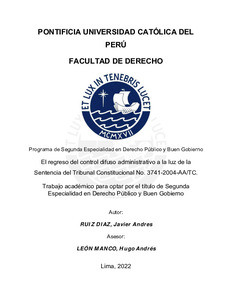El regreso del control difuso administrativo a la luz de la Sentencia del Tribunal Constitucional No. 3741-2004-AA/TC
Abstract
El presente informe gira en torno a una controversia jurídica originada por el precedente
vinculante que se desprende de la sentencia del Tribunal Constitucional en el contexto
del Caso Salazar Yarlenque. En aquel precedente vinculante, se legitimó la posibilidad
de que los órganos administrativos que reparten justicia puedan inaplicar normas infra
constitucionales que se manifiesten como incongruentes con relación a valores
garantizados constitucionalmente y que reflejan el ordenamiento jurídico dentro de un
Estado Social y Democrático de Derecho. No obstante, pasado varios años, otra
sentencia del sumo interprete constitucional decide dejar sin efecto el precedente
vinculante materia de esta controversia, en tanto arguye que se ha distorsionado la
interpretación del alcance de las funciones jurisdiccionales en el Estado según el cual
esta función correspondería exclusivamente al Poder Judicial y sus órganos adscritos.
En ese sentido, este artículo académico profundiza en la discusión constitucional
respecto de los límites y alcances de las funciones jurisdiccionales de la administración
pública como una de las entidades clave para el adecuado funcionamiento del aparato
estatal. En consecuencia, se analizará la validez de la aplicación del control difuso, como
herramienta jurídica legitimada por el artículo N.º 138 de la Constitución, por parte de los
órganos administrativos que reparten justicia para decidir por la inaplicación de normas
jurídicas que, aunque sean lícitas, representen un elemento potencialmente perjudicial
para el interés general y la defensa de los derechos fundamentales de los administrados.
Finalmente, se evaluará si en la actualidad sería posible regresar a la línea
jurisprudencial que legitima el control difuso en sede administrativa. In this article, a legal controversy arises regarding the binding precedent established by
the ruling of the Constitutional Court in the context of the Salazar Yarlenque case. In the
above-mentioned binding precedent, it was legitimized the possibility that the
administrative agencies that impart justice can disregard infra-constitutional rules that are
contradictory to the principles and values constitutionally guaranteed and that define legal
system under a Social and Democratic State of Law. Nonetheless, many years later, a
different ruling of the Constitutional Court decided to overturn the binding precedent that
is subject of this controversial case, as it argued that the interpretation of the scope of the
jurisdictional functions in the government has been misinterpreted, whereby these powers
would exclusively concern Judiciary Branch and its associated institutions.
In that regard, this article of professional sufficiency deepens in the constitutional
discussion regarding the boundaries and scope of the jurisdictional functions of public
administration as one of the key entities for the proper functioning of the state
administration apparatus. Consequently, this paper will analyze the legitimacy of the
application of diffuse control, as a legal tool authorized by article 138 of the Constitution,
for administrative institutions that administer justice in order to rule on the inapplication of
legal norms that, regardless of being lawful, represent a potentially harmful component to
general interest and to the protection of fundamental rights of those who are subject to
the administration. Finally, it will be evaluated whether it would be possible to return to
the jurisprudential position that legitimizes diffuse control in the administrative courts.
Temas
Control difuso
Procedimiento administrativo
Administración pública--Perú
Procedimiento administrativo
Administración pública--Perú
Para optar el título de
Segunda Especialidad en Derecho Público y Buen Gobierno
Collections
The following license files are associated with this item:






